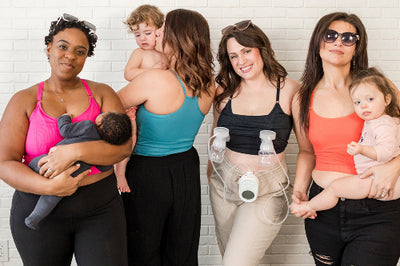Some blog posts may contain affiliate links to support the moms in this community. If you choose to purchase products through these links, we will earn a small commission at no additional cost to you. Thank you for your support!
5 Things To Know About Breast Cancer Awareness
Every October, we celebrate breast cancer awareness month, so I thought it would be a great time to talk about it! But, beyond wearing extra pink throughout the month, here are 5 things you should know about breast cancer as a breastfeeding mom.
1. Make Yearly Well-Checks a Priority
It is recommended that women over the age of 20 get a thorough wellness exam every year. This can help you catch issues early on and bring up any concerns you have with your doctor. In addition, you should talk to your doctor about breast cancer awareness and if you have any reasons to worry.
Then, after age 40, women should schedule a mammogram each year. A mammogram exam is a preventative measure that can help catch signs of breast cancer early on, mainly because it is more likely to see breast cancer in older women (although, it’s not impossible to get it when you are younger.).
Mammogram exams can seem scary for many women, but they are an important part of your health! The National Breast Cancer Foundation has an article that goes over some things to share during your exam, such as any concerns, if you are considered high-risk, if you have pain, etc.

2. Know the Signs of Breast Cancer
Another important part of breast cancer awareness is understanding the typical signs so you can catch them early on. Breast Cancer Now explains that there are three simple ways to prepare: touch your breasts for any new or unusual changes, look for changes, and then check with your provider if you notice anything unusual.
Some signs that you might see or feel include:
- Lumps or swelling
- Skin changes (dimples, puckering, etc)
- Color changes (i.e. red or inflammation)
- Nipple changes (for example, if your nipple becomes inverted)
- Rash
- Unusual discharge
- Breast size or shape change
- Consistent or frequent pain
In addition, you should also consider all areas of the breast, including up into your armpits and collarbone.
3. Know the Risk Factors
Although breast cancer can affect anyone (even men), there are few common risk factors associated with it.
Some of these risk factors include being a woman, above the age of 50, and having a genetic reason. This is also why understanding your family medical history is important, because it can help you catch those risk factors early on. If the people in your family have had breast cancer, it puts you at a higher risk for also having it.
The CDC explains that there are around 264,000 women each year who get breast cancer, so having breast cancer awareness can help you catch it early on, making it much more likely to be able to be treated.
4. Focus on a Healthy Lifestyle
Although living healthy doesn’t completely rule out breast cancer, the next best way to prevent this diagnosis (besides knowing the signs and checking for them frequently) is to live a healthy lifestyle.
Some things that you can do are exercising regularly, drinking alcohol in moderation (or not at all), and talking to your doctor about the risks associated with hormone replacement therapies and birth control pills. In addition, breastfeeding has been found to be a large part of preventing breast cancer in women.

5. Breastfeeding and Breast Cancer Awareness
One of the benefits for a breastfeeding mother is that continued breastfeeding can actually help prevent breast cancer! In one study, for every 12 months of breastfeeding, there was a 4.3% reduction in breast cancer risk.
However, it’s also important to realize that these statistics don’t mean a breastfeeding mom won’t get breast cancer… in fact, it is still possible to get breast cancer while you are breastfeeding. The risk is just lowered.
Many of the signs of breast cancer are similar to what a breastfeeding mom might see or feel while breastfeeding. Things like small lumps could be clogged milk ducts or even the simple fact that your breasts tend to get bigger during pregnancy and breastfeeding. This is why breast cancer awareness is so important to moms, even while you are young! Any concerns that you have or symptoms that don’t go away should be discussed with a doctor so you can make sure that you receive the proper treatment.
The Importance of Breast Cancer Awareness
Because there are so many people diagnosed with breast cancer each year, it is important to stay on top of your health and speak to a healthcare provider if you have any concerns. The earlier you can catch the symptoms and understand your individual health risks, the better!
Don’t forget to subscribe to the blog for more breastfeeding tips and to hear about our line of breastfeeding-friendly bras and more!






